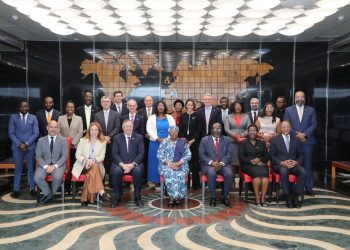
Petrobras is waiting on Galp’s decision regarding its offer to acquire a significant stake in the Mopane block offshore Namibia, marking a strategic push by Brazil’s state oil giant into Africa’s promising offshore fields. Petrobras recently announced plans to explore opportunities in South Africa, Namibia, and Angola.
“As we ramp up production, we need new reserves. Brazil has long-standing ties with Africa, and we’re eager to return,” said Sylvia Maria Couto dos Anjos, Petrobras’s Executive Officer for Exploration and Production, at a pre-event for African Energy Week (AEW).
Petrobras’s expertise in pre-salt geology—extracting hydrocarbons from ultra-deep reservoirs under thick salt layers—could make it a strong contender for accessing untapped resources in Southern Africa. Industry experts highlighted Angola’s geological similarities to Brazil, where Petrobras’s Campos and Santos basins have produced significant offshore oil and gas reserves.
“Both Angola and Brazil have deepwater experience,” said Ricardo Van-Deste, CEO of Sonangol’s Exploration and Production unit. “We welcome Petrobras back to Angola; the door remains open.”
In South Africa, Petrobras’s deepwater technology could unlock offshore reserves, potentially transforming the region’s energy landscape. Petrobras recently secured a 10% stake in the Deep Water Orange Basin off South Africa’s west coast, adjacent to TotalEnergies’ Luiperd and Brulpadda discoveries.
“These are challenging projects, but Petrobras’s expertise could provide a valuable boost,” said Godfrey Moagi, CEO of the South African National Petroleum Company (SANPC).
In Namibia, Petrobras is also evaluating entry opportunities, drawn by recent world-class discoveries. The country is estimated to hold around 100 billion barrels of oil equivalent in unrisked resources, with the Deep Water Orange Basin alone accounting for about 30 billion barrels.
“The potential in Namibia is vast. Deals are on the horizon,” said Dr. Marcio Rocha Mello, CEO of Namibia Energy Corporation.
Further collaboration could involve establishing a Namibian center of excellence to enhance technical capacity and deepen understanding of the nation’s petroleum basins, aiding future exploration.
“A center here would let us replicate the Orange Basin’s success in the Walvis and Lüderitz basins,” said Maggy Shino, Namibia’s Petroleum Commissioner. “We have massive opportunities requiring diverse players to harness their full potential.”
In April, Galp initiated the sale of half its 80% stake in Petroleum Exploration Licence 83 (PEL 83), along with operatorship rights, opening doors for new entrants like Petrobras.







